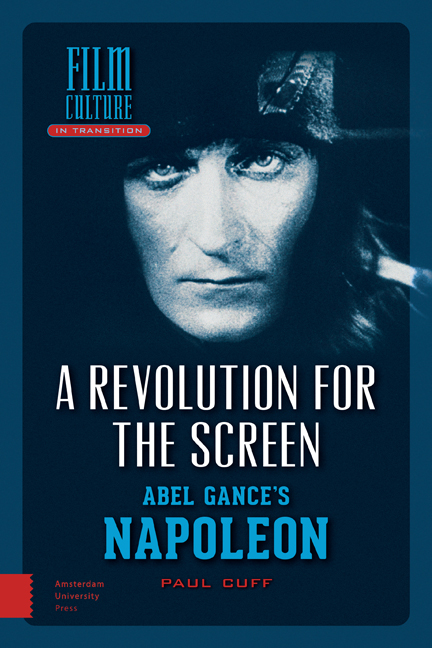Book contents
- Frontmatter
- Dedication
- Contents
- List of Illustrations
- Note on Formatting
- Acknowledgements
- Foreword
- Preface: Critical perspective
- 1 Napoleonic Ambition and Historical Imagination
- 2 Shaping Expectations: The Young Napoléon Bonaparte
- 3 Civilization and Savagery: Visions of the French Revolution
- 4 Mortal Gods: Voices of Power and of Providence
- 5 The Dark Light of Napoleonic Cinema
- 6 A View from the Margins of History
- 7 Melodrama and the Formulations of Family
- 8 Worlds in Transition: Class, consumption, Corruption
- 9 Death and Transfiguration
- Conclusion: The Case for Enthusiasm
- Filmography and Bibliography
- Index
- Film Culture in Transition
9 - Death and Transfiguration
Published online by Cambridge University Press: 10 December 2020
- Frontmatter
- Dedication
- Contents
- List of Illustrations
- Note on Formatting
- Acknowledgements
- Foreword
- Preface: Critical perspective
- 1 Napoleonic Ambition and Historical Imagination
- 2 Shaping Expectations: The Young Napoléon Bonaparte
- 3 Civilization and Savagery: Visions of the French Revolution
- 4 Mortal Gods: Voices of Power and of Providence
- 5 The Dark Light of Napoleonic Cinema
- 6 A View from the Margins of History
- 7 Melodrama and the Formulations of Family
- 8 Worlds in Transition: Class, consumption, Corruption
- 9 Death and Transfiguration
- Conclusion: The Case for Enthusiasm
- Filmography and Bibliography
- Index
- Film Culture in Transition
Summary
In classical Greek theatre a hero can only exist in the genre of tragedy, which makes people appear more than they are and lends their stature to figures who are not necessarily virtuous or attractive. The more tragic the action, the more terrible the trials to which he is subjected, the greater the hero appears. The same was true for the Romantics, who were fascinated by the concept of man living out a tragic destiny. To be interesting, a man had to be both colossus and victim (Zamoyski 2005: 556).
Introduction
During his last years of exile on the island of St Helena, Napoléon reflected on the historical benefits of defeat: ‘If I had died on the throne, swathed in my military power, I would remain problematic for many people; today, thanks to misfortune, they will be able to judge me stripped bare’ (Las Cases [1822-3] 1842: I/212). Lacking its last episodes, Gance's incomplete Napoleonic saga cannot offer the same kind of perspective on its subject matter. Its narrative having ended with a glorious triumph in 1796, Napoléon has fooled many critics into thinking its author naively endorses the whole of Bonaparte's future career.
To provide a more complete interpretation of Gance's historiography, I will turn to the evidence of the two last cinematic projects he pursued during the silent era: the sixth episode of his series, SAINTE-HÉLÈNE (1927-8), and the biopic VICTOR HUGO (1928-9). The former screenplay was completed and ready for publication, but the latter never advanced beyond an extensive folder of notes. Though both films remain unrealized, the surviving material illustrates Gance's efforts to develop the creative imagination seen in NAPOLÉON. Each transforms historical and literary material into an account of ‘great men’ through whom we are shown the spirit of the French Revolution and its legacy for future centuries.
From history to legend
Aided by his assistant writer Georges Buraud, Gance began drafting SAINTE-HÉLÈNE in late 1927 and finished the screenplay in September 1928. Originally called ‘The Fallen Eagle’, this ‘Cinematic Tragedy in Three Parts’ follows the Emperor's career from the aftermath of his defeat at Waterloo in June 1815 to his death on St Helena in May 1821.
- Type
- Chapter
- Information
- A Revolution for the ScreenAbel Gance's Napoleon, pp. 223 - 242Publisher: Amsterdam University PressPrint publication year: 2015



